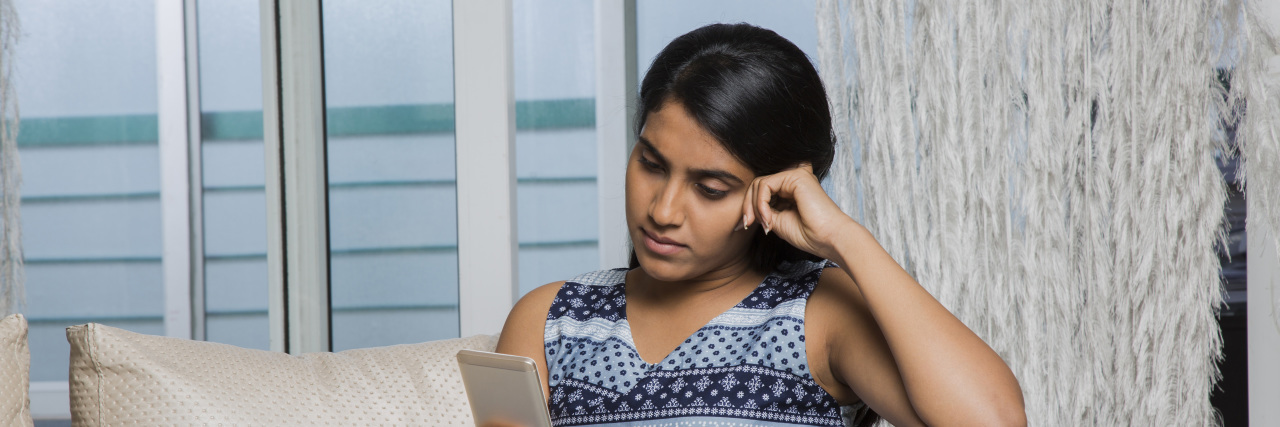Dealing with attention-deficit/hyperactivity disorder (ADHD) is challenging — focusing seems impossible most of the time, I forget a lot and have trouble staying engaged in conversations. However, all of that pales in comparison to what I consider the hardest part of having ADHD; RSD, or rejection sensitive dysphoria, is a little known, under researched and under addressed part of ADHD. It’s basically a hypersensitivity to rejection, as well as perceiving things that aren’t rejection as rejection. It’s super debilitating because the feelings of rejection are so intense and so sudden that doing anything else seems impossible. I find myself struggling to breathe when the RSD is strong because it’s like getting hit in the stomach with a basketball.
Other relevant stories:
• Can You Join the Military With ADHD?
• ADHD vs. Anxiety
• How to Discipline a Child With ADHD
• What is ADHD?
For me, one of the biggest manifestations of RSD is when I get left on “read” — meaning a friend sees a text message/DM and doesn’t respond, leaving me with a read receipt. While I logically know that being left on read isn’t actually someone rejecting me (I understand they could be busy, or distracted, or thinking up their response), emotionally I instantly feel rejected and start to spiral. Thoughts of “did I say the wrong thing,” “are they angry with me,” “did I make a mistake,” “they must hate me,” “they don’t want to talk to me,” “they must be annoyed at me” or “I am not worth their time” start bouncing around my head.
The sensitivity is so strong and so intense that I often find myself doing the things I hate the most in order to avoid the anxiety of experiencing RSD — I’ll ignore messages, leave people on read or shut down and withdraw to avoid the possibility of rejection. Essentially, in order to avoid being rejected, or perceive being rejected when I really am not being rejected, I end up rejecting others. And that is a lonely place to be. The RSD and associated fears also make me less likely to share what I’m feeling — for example, I may be missing a friend a lot but I don’t want to say “I miss you” because I know if they don’t say it back, I’ll freak out. I also hate being the first to say “I love you” to someone and will only say it if I can guarantee it’ll be returned or if they say it first. And that’s not really fair to the people who love me, because they constantly have to prove they care about me or reiterate it. I can logically know that someone loves me, but if they don’t say it when I say it, or don’t express they miss me when I miss them, I immediately think the worst.
RSD also makes me hypersensitive to criticism, especially in a work setting. I struggle with constructive feedback, even though I know it’s necessary to make me grow. I’m always trying to improve, and seeking feedback is an important part of improving but I get so nervous about what people will say. On the surface, I take constructive feedback well but underneath I start to rip myself apart and the basketball-to-the-stomach sensation returns. In order to avoid being blind sided by any sort of criticism, I end up being the hardest on myself and the most critical of anything I do. That ends up taking a huge toll on my self esteem, because I constantly fixate on the things I do wrong so I can catch them before anyone else does.
It’s estimated that children with ADHD can experience 20,000 negative messages about their abilities by the age of 10 because they are not neurotypical, and that may be a contributor to RSD. I often think about how that number varies depending on other “differences” those kids have. What about the negative messages associated with being a person of color? A woman? Queer? In addition to having ADHD, how many more negative messages would they get? It’s no wonder RSD is such a huge part of my life and experience with ADHD.
I’m starting to find ways to communicate about my RSD with my friends — whether it’s letting them know how much of a negative impact being left on read has, or asking them to let me know when they are busy or preoccupied so I don’t wonder why they don’t want to talk to me. RSD makes me take everything personally, and it’s hard to remember that most people still love and care about me — they might just be busy or tired. I appreciate when my friends let me know what they’re up against, and what’s going on in their lives because it helps me counteract all the RSD thoughts.
RSD is frustrating because it’s a lonely experience. Most people don’t understand how intense it is, and may find my sensitivity or need for reassurance annoying. I hope that as I become less insecure about myself, and build my confidence up, I’m able to keep the RSD at bay more or at least have greater success with counteracting it. I hope that I am able to self-reject less, that when I feel close to someone or disconnected, I lean into connection more versus pulling away to avoid future rejection. It’s not easy, but having supportive friends who are patient and willing to help me through makes a huge difference. A simple “I’m thinking of you” or “I’ll answer you as soon as I’m off work” or “Would love to chat more! Let’s have a call?” can make such a huge difference in making me feel less rejected and more connected.
Lead image courtesy of Getty Images

